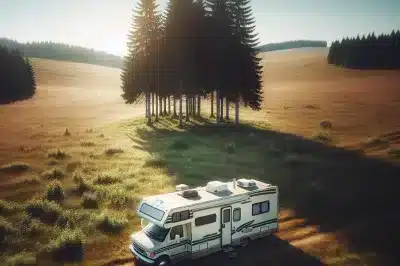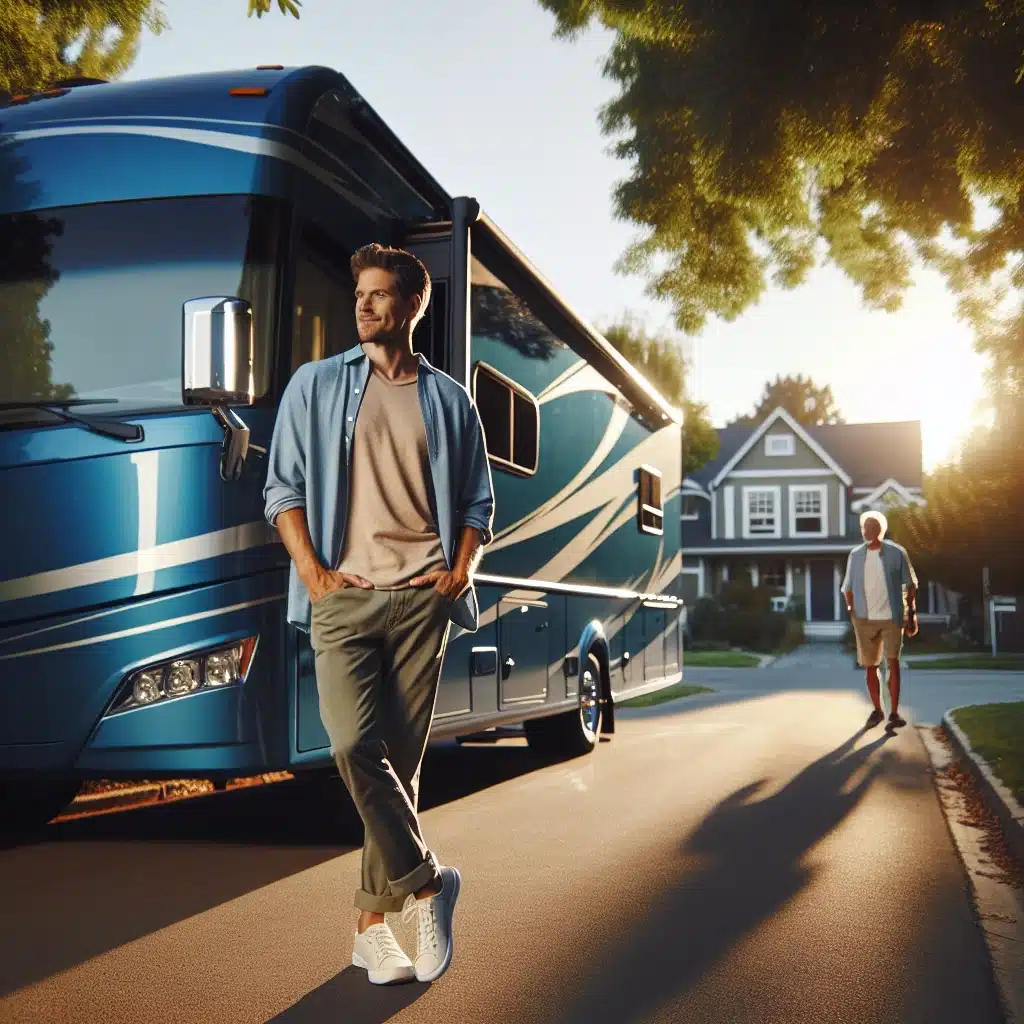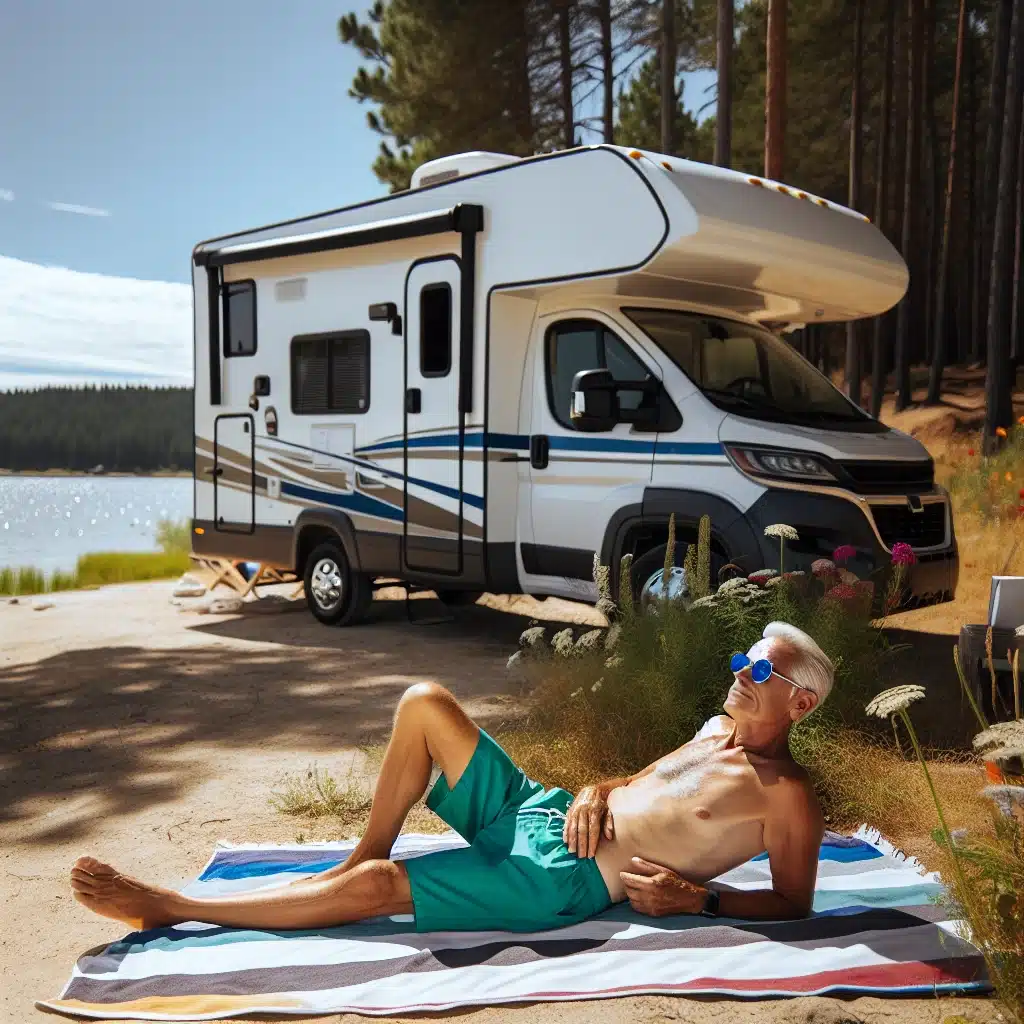Table of Contents

Powering Your RV Off the Grid: Solar vs. Generators
Imagine the freedom of exploring without the tether of electrical hookups. Boondocking, or dry camping, offers this liberty, but it also requires a reliable power source. The debate between solar power and generators is a hot topic among RV enthusiasts. Let’s break down the benefits and drawbacks to help you make an informed decision for your off-grid adventures.
Key Takeaways
- Solar power offers a quiet, maintenance-free energy source for boondocking.
- Generators provide quick and powerful energy but can be noisy and require ongoing fuel and maintenance.
- Understanding your power needs is crucial for deciding between solar and generator options.
- Environmental impact and long-term costs are important factors to consider.
- Combining both solar and generator power can offer a versatile and reliable energy solution.
What is Boondocking in an RV?
Boondocking is the art of camping in your RV without any hookups to water, sewer, or electricity. It’s about self-sufficiency and getting closer to nature. You can find yourself in the heart of the wilderness, a quiet desert, or even a secluded beach. The key is being prepared with the right power source to meet your needs.
The Basics of RV Boondocking
Boondocking basics start with conservation. You’ll need to be mindful of your water usage, waste disposal, and, most importantly, your energy consumption. Efficient use of resources not only extends your stay in the wild but also respects the environment around you.
Challenges of Off-Grid RVing
Off-grid RVing presents unique challenges, such as managing power reserves and dealing with unpredictable weather. Your energy needs to last throughout your stay, and you must be ready to adapt to changing conditions. This is where the choice between solar power and generators becomes critical.

The Case for Solar Power in Boondocking
When it comes to harnessing the power of the sun, solar energy is a game-changer for boondockers. It’s a clean, quiet, and renewable source that can keep you powered up without a constant need for fuel or maintenance. Let’s explore how solar power can meet the demands of life on the road.
Solar Power Essentials
To get started with solar power, you’ll need a few key components: solar panels, a charge controller, batteries for energy storage, and an inverter to convert stored energy into usable electricity. These essentials form the backbone of your solar power system and provide a steady flow of electricity.
Advantages of Solar Energy for RVs
Solar energy is not just about being eco-friendly; it’s also about convenience and cost savings in the long run. Here’s why solar power is a smart choice for your RV:
- It’s silent, unlike the constant hum of a generator.
- There are no ongoing fuel costs—just free energy from the sun.
- Maintenance is minimal, mostly just keeping panels clean.
- Solar power is sustainable, reducing your carbon footprint.
- It increases the resale value of your RV with a modern upgrade.
Choosing solar power for your RV is a long-term investment in your freedom and comfort while boondocking. With the sun as your fuel source, the great outdoors becomes your limitless backyard.
Solar Power System Components
Building a solar setup for your RV involves several key components. You’ll need solar panels to capture the sun’s energy, a charge controller to manage the power going into your batteries, the batteries themselves to store the energy, and an inverter to convert DC power to AC for your appliances. Additionally, proper cabling and mounting hardware are essential for connecting and securing your system.
Installation and Upkeep
Installing a solar power system can be a DIY project if you’re handy, or you might prefer to hire a professional. Either way, it’s a one-time setup with long-term benefits. Upkeep is minimal: keep the panels clean and check connections occasionally. The simplicity of solar means more time enjoying nature and less time on maintenance.
Generator Use While Boondocking
Generators are a common choice for RVers who need reliable power for high-consumption appliances or for those who camp in areas with limited sunlight. They can quickly recharge your batteries and power everything in your RV, but they come with their own set of considerations.
Understanding RV Generators
RV generators come in various sizes and fuel types, including gasoline, diesel, and propane. They’re rated by wattage to match your power needs. A generator’s job is straightforward: to convert fuel into electrical power, providing energy when and where you need it.
Perks of Using Generators
- Immediate power on demand, regardless of weather conditions.
- Capability to run high-wattage appliances like air conditioners and microwaves.
- Portability, allowing you to use it for other outdoor activities.
- Generators can be a backup power source if your solar system falls short.
Choosing the Right Generator for Your RV
Selecting the right generator means considering your specific power needs, fuel preferences, and noise tolerance. It’s about finding the balance between portability, power output, and budget. Always opt for a generator that meets your RV’s power requirements without going overboard.
Maintenance Requirements for Generators
Unlike solar systems, generators require regular maintenance. This includes oil changes, filter replacements, and fuel management. Neglecting these tasks can lead to reduced efficiency or even generator failure, so stay on top of maintenance for uninterrupted power.

Comparing Costs: Solar Panels vs. Generator Purchase and Operation
Cost comparison between solar panels and generators isn’t just about the upfront purchase price. You must also consider the long-term operational expenses. Solar panels have a higher initial cost but minimal ongoing expenses, while generators are typically cheaper to buy but cost more over time due to fuel and maintenance.
Initial Investment and Long-Term Value
When you’re considering solar panels or a generator, it’s vital to look beyond the sticker price. Solar systems may have a higher upfront cost, but they’re a one-time investment. Over the years, the savings on fuel and maintenance costs can be substantial, making solar a valuable asset for your RV.
Ongoing Costs and Maintenance
After the initial setup, solar panels require little more than a clean surface to function efficiently, translating to virtually zero ongoing costs. Generators, on the other hand, have recurring expenses for fuel, oil, and filters. These costs can add up, especially if you’re on extended trips frequently.
Reliability in Diverse Environments
Reliable power is non-negotiable when you’re living off the grid. Both solar power systems and generators have their strengths, but their reliability can be affected by the environments you choose to explore. Your adventures shouldn’t be limited by your power source’s ability to keep up.
Adapting to Weather Conditions
Solar power systems depend on sunlight, which can be unpredictable. On cloudy days, power generation will decrease. Generators don’t rely on weather, providing consistent power regardless of the skies above. However, extreme temperatures can affect their efficiency and operation.
Ensuring Continuous Power Supply
To guarantee a continuous power supply, many RVers use a combination of solar and generator power. Solar can provide daily energy needs, while a generator can be reserved for backup or high-demand situations. This hybrid approach offers flexibility and peace of mind.

Environmental Considerations for Eco-Conscious RVers
Eco-conscious RVers often prefer solar power for its minimal environmental impact. Generators burn fossil fuels, which contribute to greenhouse gas emissions. Solar panels, however, convert sunlight into electricity without pollution or resource depletion.
Evaluating the Carbon Footprint
When assessing your carbon footprint, the difference between solar panels and generators is stark. Solar panels have a one-time environmental cost for manufacturing but offer clean energy thereafter. Generators continuously emit carbon dioxide every time they run, contributing to your carbon footprint.
The Quiet Nature of Solar Energy
One of the most appreciated benefits of solar power is its silent operation. Generators can be disruptive, not just to you but to the natural surroundings. Solar panels allow you to enjoy the tranquility of your off-grid setting without the intrusive noise of a running generator.
Usability and Convenience in Real-World Boondocking
When you’re miles away from the nearest RV park, usability and convenience of your power source aren’t just nice to have—they’re essential. Let’s talk about what this means for your solar setup or generator when you’re out there, living the boondocking dream.
Ease of Use During Travel
Traveling with solar panels is a breeze once they’re installed. There’s no setup or teardown time each day—you just park and start living. Generators, while portable, require you to set them up, start them, and ensure they’re secure every time you move. It’s about getting to your destination and being able to kick back without hassle.
Storage and Portability Concerns
Space is at a premium in an RV, and how you use it matters. Solar panels sit on your roof, out of the way. Batteries and other components can be tucked into storage areas, utilizing space that often goes unused. Generators need to be easily accessible, which can mean sacrificing valuable storage or living space.
A Personal Touch: Real-Life Boondocking Stories
There’s no substitute for real-life experiences. Hearing from fellow boondockers about their triumphs and trials with solar power and generators can be enlightening. These stories paint a vivid picture of what to expect and prepare for in your own off-grid adventures.
Traveler Testimonials: Solar Success Stories
Meet Jim and Kathy, who’ve been boondocking across the southwest. They rave about their solar setup, which has allowed them to stay in remote locations for weeks at a time. The peace and self-sufficiency they’ve experienced have transformed their RV lifestyle, making them solar power advocates.
Common Generator Grievances and Glory
On the flip side, consider Mark, who prefers his trusty generator. While he acknowledges it’s louder and requires more effort, he values the immediate power it provides. However, he’s had to deal with fuel spills and the occasional maintenance headache, which reminds us that every choice has its trade-offs.
FAQs for Boondocking Power Choices
You’ve got questions, and I’ve got answers. Let’s tackle some of the most common queries about powering your RV for boondocking. From sizing your solar system to understanding your energy needs, I’ll provide the guidance you need to make the best choice for your off-grid lifestyle.
How do I determine the right size solar system for my RV?
Figuring out the right size solar system for your RV isn’t as daunting as it sounds. Start by calculating your daily energy usage. List all your appliances and how long you use them each day. Then, factor in sunlight hours and battery storage capacity. This will give you a clear picture of the system size you’ll need to keep your adventures powered up.
Can I run my air conditioner using solar power while boondocking?
Running an air conditioner on solar power is possible, but it requires a substantial solar setup. Air conditioners are power-hungry appliances, so you’ll need enough solar panels and battery capacity to handle the high energy demand. This typically involves a large battery bank and a powerful inverter. It’s a significant investment, but for those who can’t do without their AC, it’s a game-changer for comfortable boondocking.
What are the most cost-effective generators for RV boondocking?
When it comes to generators, cost-effectiveness doesn’t just mean the purchase price. You’ll want to consider fuel efficiency, durability, and the power output relative to your needs. Inverter generators are a popular choice for boondockers because they’re quieter and more fuel-efficient than traditional portable generators. Brands like Honda and Yamaha are known for their reliability and longevity, which can save you money in the long run.
How often will I need to perform maintenance on my solar panels or generator?
Solar panels are relatively low-maintenance. They typically require a cleaning a few times a year to ensure they’re operating efficiently. Just keep them free of debris and dirt. Generators, however, demand more attention. Regular oil changes, fuel system checks, and general inspections should be done according to the manufacturer’s recommendations, which is often after a certain number of operating hours or annually.
Can I switch from generator power to solar power, or use both?
Absolutely! Many boondockers use a hybrid system that combines solar power with a generator backup. Solar panels can provide daily energy, and when the sun isn’t enough, you can switch to your generator. This approach gives you the best of both worlds: the quiet, sustainable energy of solar and the reliable, on-demand power of a generator.
In conclusion, the choice between solar power and generators for boondocking in your RV is a personal one, influenced by your energy needs, travel style, and environmental considerations. Solar offers a silent, maintenance-free experience with a higher upfront cost but can save you money and give you peace of mind in the long run. Generators provide immediate, powerful energy but come with noise, maintenance, and ongoing fuel costs.
Happy trails and sunny days to you, fellow boondockers!
- Boondocking RVs: Flexible Solar Solutions – 3 March 2024
- Renewable Energy Tips for Full-Time Boondocking RVers – 2 March 2024
- Boondocking Solar Power Systems: Sizing Options & Solutions for Motorhomes – 1 March 2024
